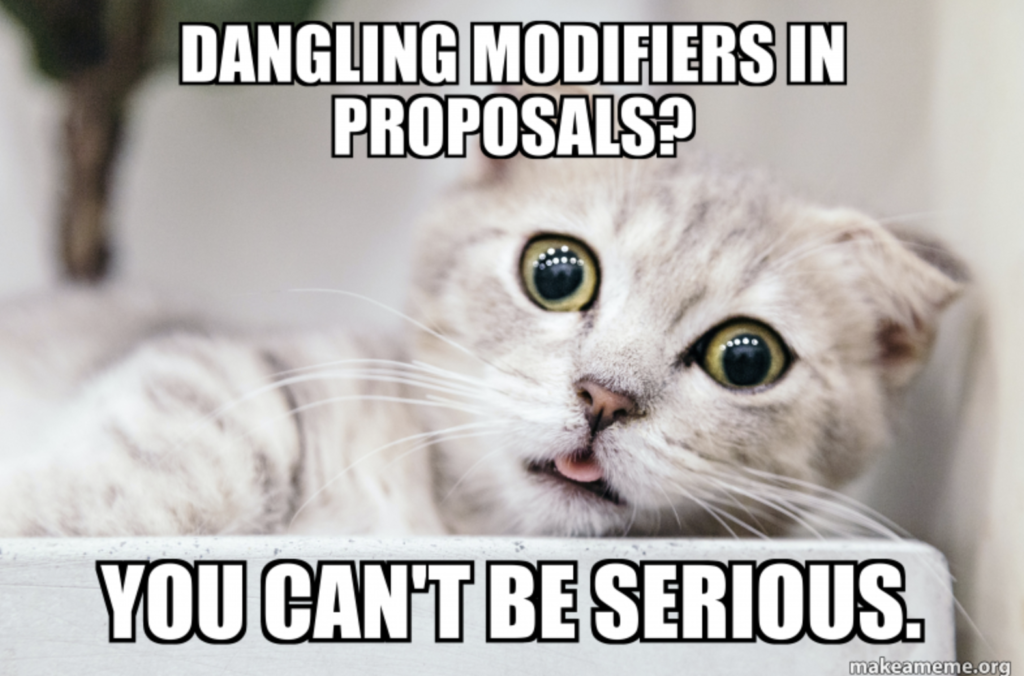Be honest. Tell me you wouldn’t be freaked out if this happened to you:
While taking a shower, Jim pounded on your door.
Think about it? Jim’s taking a shower at his house, and his reach is soooo long, he’s at your front door demanding to be let in. I know I wouldn’t let Jim in.
What’s that, you say? That’s not what the sentence says. You misinterpreted the sentence. Jim wasn’t the person in the shower, you were.
No, I’m sorry, but you’re wrong. That is what the sentence says. Welcome to the world of dangling modifiers.
What’s a dangling modifier?
A dangling modifier, sometimes referred to as a misplaced modifier, occurs when a word, phrase or clause is improperly separated from the word it modifies or describes. A dangling modifier is basically the same as a misplaced modifier – the only difference is that in a dangling modifier the subject is not stated (more on misplaced modifiers in a moment).
Modifiers should precede the word(s) it is modifying. For example, in our sentence, the person taking a shower is not Jim, but you. Thus, we need to fix the dangling modifier, which can be done a couple of ways:
- While you were taking a shower, Jim pounded on your door.
- Jim pounded on your door while you were in the shower.
Circling back to misplaced modifiers, let’s revisit our friend Jim.
Jim arrived at your house and pounded on your door covered with sweat.
Unless your door was covered in sweat, this sentence would need to be recast to eliminate the misplaced modifier: Jim arrived at your house covered with sweat and pounded on your door.
As I was saying
Although it is extremely unlikely that we will ever find the previous sentences or something similar in a proposal, our work is not immune to dangling modifiers. In fact, they show up quite often in business writing – mostly because business writing is inherently clunky and convoluted.
Nevertheless, it’s important to purge misplaced modifiers not just because of the grammar violation, but because they can confuse – or worse, lose – your audience.
Here are some real-life examples along with how they were fixed. The dangling or misplaced modifier is in bold.
- As the nation’s largest vending services company, our innovative solutions, wellness initiatives and exceptional service have kept us the industry leader for more than eight decades.
- We are the nation’s largest vending services company, and our innovative solutions, wellness initiatives and exceptional service have kept us the industry leader for more than eight decades.
- As your strategic partner and service provider, you will benefit from the vast resources and proven processes.
- With Crothall Healthcare as your strategic partner and service provider, you will benefit from our vast resources and proven processes.
- The school purchased produce from a local farmer weighing 300 pounds.
- The school purchased produce weighing 400 pounds from a local farmer.
- Because of COVID-19 protocols, our frontline associates will serve sandwiches to students on paper plates.
- Because of COVID-19 protocols, our frontline associates will serve sandwiches on paper plates to students.
Do you notice a pattern in the first two fixes? We eliminated the clause and started each sentence with a simple, easy-to-understand noun-verb structure. In the final examples, we simply moved the misplaced phrase next to the noun it modifies.
If only that were it
Ah, the word “only.” That word gets a category all its own in the Misplaced Modifier Hall of Fame. Thus, you’ll have to wait until later this year when we have a whole separate blog tackling it.

Final thought on misplaced modifiers
You don’t need to be a grammar maven to ferret out misplaced modifiers. Simply ask yourself if the clause or word you just wrote is modifying its intended target – and that target (or noun) should immediately follow the modifier.
In the meantime, we’ll do our part and keep an eye out for cats that read and guys named Jim with long arms.
Don’t be sad. We’ll be back on the first Monday next month with a new blog post. If you can’t wait that long – whether because you have a topic you’d love us to cover, a question or you simply want to throw your two cents into the pot – we love talkin’ shop, so drop us a line.






